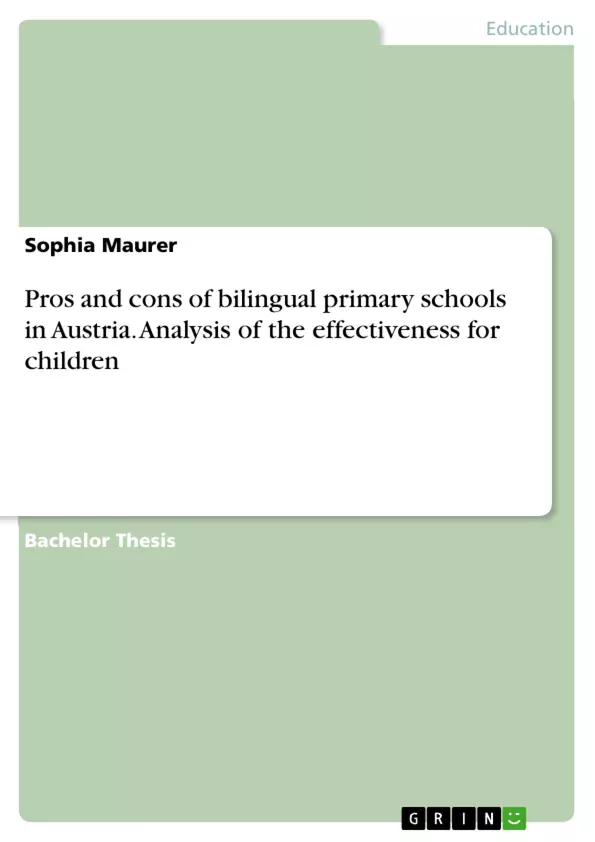In dieser Arbeit soll herausgefunden werden, ob die Einführung einer bilingualen Volksschule für alle Kinder sinnvoll wäre. Englisch ist heutzutage eine der wichtigsten Sprachen der Welt. Da es Kindern besonders leicht fällt neue Sprachen zu lernen, ist es sinnvoll so früh wie möglich damit zu beginnen. Außerdem legt die EU besonders großen Wert darauf, dass jedes EU-Mitglied mindestens zwei weitere Sprachen, die in der EU gesprochen werden, beherrscht. In österreichischen Volksschulen wird Englisch als "Verbindliche Übung" unterrichtet. In der ersten und zweiten Schulstufe sollen insgesamt 32 Jahresstunden Englisch unterrichtet werden. Ab der dritten Schulstufe gibt es eine festgelegte Wochenstunde Englisch. Obwohl es viele Gründe gibt, warum es sinnvoll ist, die Kinder beim Englischerwerb zu unterstützen, wird dies in österreichischen Schulen immer noch nicht angemessen verwirklicht.
When you take a closer look you realize that five out of the eight Austrian neighboring countries have another official language than German. Knowing that there are 24 official languages in Europe it is obvious that the EU wants its citizens to learn as many languages as possible. English is a universal language which is used to communicate with people who do not speak each other’s first languages. Being able to speak English is a skill which is not only helpful to have a successful school career but to have success in life. Elementary schools are primarily responsible to introduce and teach English to all children. Most bilingual elementary schools are run completely or partly private which makes it impossible for families with lower incomes to enroll their children in these private bilingual schools. Wouldn't it be great if every child in Austria could get an education in both English and German in their public elementary school?
Table of Contents
- Introduction
- Multilingualism
- What is multilingualism?
- Encouragement of individual multilingualism
- Curricular background
- Didactical approach and concept to expand the linguistic capacity to act
- Multilingualism in Viennese classrooms
- Multilingualism in school
- Language use in school
- Bilingual education and effectiveness
- When is a child considered bilingual?
- How does the language development for children with German as a second language work?
- Which role does the mother tongue/first language play?
- How can the parents support the multilingual development of their child?
- How can educators help children with German as a second language?
- Austrian examples
- Innsbruck Elementary School
- Goals, Beliefs & Values
- Expectations
- Accreditation
- pros and cons of bilingual education
- summary
Objectives and Key Themes
The objective of this Bachelor thesis is to explore the effectiveness of bilingual elementary schools in Austria. The author aims to analyze the benefits and challenges of bilingual education for students, teachers, and the wider community.
- The impact of multilingualism on language development and cognitive skills.
- The effectiveness of bilingual education programs in improving language proficiency.
- The role of parental support and teacher training in successful bilingual education.
- The potential benefits of bilingual education for the social and cultural development of students.
- The challenges and limitations of implementing bilingual education in Austria.
Chapter Summaries
The first chapter provides an introduction to the topic of bilingual education in Austria, highlighting the importance of multilingualism in a globalized world. The second chapter explores the concept of multilingualism, examining its influence on language development, the role of curricular background, and the importance of a didactical approach to expanding linguistic capacity. Chapter three focuses on the effectiveness of bilingual education, examining the definition of bilingualism, language development for children with German as a second language, the role of the mother tongue, and the importance of parental and educator support. Chapter four presents Austrian examples of bilingual elementary schools, highlighting the goals, beliefs, expectations, and accreditation process of these institutions.
Keywords
The central keywords and focus topics of this Bachelor thesis include multilingualism, bilingualism, effectiveness, and school. The work explores the benefits and challenges of bilingual education in the Austrian context, aiming to contribute to the ongoing discussion on the best practices for promoting language acquisition and cultural diversity within the education system.
Frequently Asked Questions
What are the benefits of bilingual primary schools?
Bilingual schools improve language proficiency, cognitive skills, and cultural awareness in children at an age when they learn languages most easily.
How is English currently taught in Austrian elementary schools?
English is taught as a "compulsory exercise" with 32 hours per year in the first two grades and one fixed hour per week from the third grade onwards.
What is the role of the mother tongue in bilingual education?
The first language or mother tongue serves as a crucial foundation for acquiring a second language and developing overall linguistic capacity.
What are the challenges for bilingual education in Austria?
Many bilingual programs are private and expensive, making them inaccessible for families with lower incomes, which raises questions about educational equality.
How can parents support their child's multilingual development?
Parents can support their children by encouraging language use at home and choosing educational environments that value multilingualism.
- Arbeit zitieren
- Sophia Maurer (Autor:in), 2020, Pros and cons of bilingual primary schools in Austria. Analysis of the effectiveness for children, München, GRIN Verlag, https://www.grin.com/document/989364



